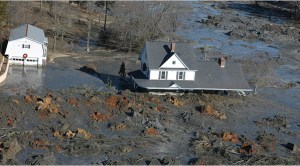Georgia’s coal ash monitoring laws are awfully easy on power companies. The companies get to monitor their heaping piles of coal ash waste piles and ponds themselves.
Thank goodness the Altamaha Riverkeeper (aided by Tonya Bonitatibus, the Savannah Riverkeeper) checked up on the coal ash ponds at Plant Blanch, which abut Lake Sinclair, last weekend.
There was a lot of activity there on Saturday, with large trucks in and out at the ponds and generators buzzing due to the tremendous amount of rain recently.
What was flowing into the lake just didn’t look like normal runoff, so Jen Hilburn, Altamaha Riverkeeper (ARK), put in a call to the Georgia Environmental Protection Division. Hilburn said in a press release, “I am deeply concerned about what sounds like pumping of water into Lake Sinclair. If this is coming directly from the coal ash ponds into the lake, it could pose a threat to our community on the lake as well as many others who utilize its waters. Georgia Power appears to be delibrately dumping coal ash waste directly into the lake. I am surprised that no-one I spoke with on Lake Sinclair had been notified in anyway by Georgia Power of their activities”

Coal ash ponds are notorious for leaking, or worse, collapsing, as they did in Kingston, TN on December 22, 2008. That community was flooded with 1.1 billion gallons of coal ash slurry from a TVA coal plant. Coal ash waste also contaminated the Dan River on the Virginia-North Carolina state line in 2014 as a result of nine criminal violations of the Clean Water Act by Duke Energy.
How risky are the coal ash ponds at Plant Branch?
Since 2010 Plant Branch’s coal ash ponds have been considered “High Hazard” for contamination or failure by the Environmental Protection Agency. Did Georgia Power try to avert a pond breach or overflow by pumping the coal ash waste into Lake Sinclair? I’m anxious to learn what the EPD says in their findings.
While ARK, and concerned citizens, wait to hear back from the EPD, the Riverkeeper is advising that no fish be consumed from Lake Sinclair until more is known about the safety of the water.
What can Georgians do in the meantime?
Our General Assembly convenes next week. Ask your state legislators NOW to require stricter monitoring of the coal ash waste landfills and ponds that pepper our state. Even though wind and solar are becoming a larger part of our fuel resources, the heavy metals and toxins in coal ash waste are forever. As last weekend demonstrates, shuttering a coal plant like Plant Branch doesn’t solve the problem of safely storing the contaminated waste it has left behind.
Allowing Georgia Power and other coal burning companies in our state to self-monitor their toxic waste isn’t working. The Georgia General Assembly can do something about that beginning next week.
